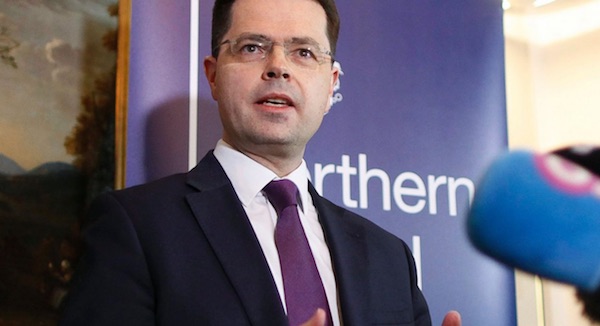
by Kevin Meagher (for Labour Uncut)
As they say in Belfast, the dogs in the street could see there was no prospect of a deal to restore power-sharing in Northern Ireland. The ‘gaps’ between the parties that James Brokenshire, the beleaguered Northern Ireland secretary told the House of Commons on Monday could be bridged have proven to be rather larger than he - and he alone it seems - assumed.
The talks have failed for three reasons. First, the Democratic Unionists’ deal with the Conservatives means there is no leverage exerted by Downing Street or the Northern Ireland Office over the DUP, which is standing four-square against the implementation of an Irish language act - the central bone of contention between them and Sinn Fein - which they claim to oppose on grounds of cost, rather than base prejudice. (Honest).
Having lavished one billion pounds in new money on Northern Ireland just last week - and guaranteed another #1.5 billion in underwriting the costs of measures like next year’s proposed corporation tax cut - a relatively small amount of funding on the Irish language is a drop in the Irish Sea. Moreover, it’s a perfectly sensible and entirely justifiable proposition given Wales has enjoyed similar legislation since 1993.
Second, the timing was awful. Expecting a deal a week out from the 12th July shows Brokenshire doesn’t even have an elementary grasp of the physics of Northern Ireland. There will be no compromise while loyalists are piling wooden crates 60 feet high with effigies of the Pope and Gerry Adams hanging from nooses. Next week is the high point of the ‘marching season’ where bonfires will be lit in commemoration of the 1690 Battle of the Boyne, where William III defeated King James I. (Nuance is lost of these occasions, as William was backed by the Pope).
So now is not the time to draw on the miniscule reserves of open-mindedness that representatives of Ulster unionism possess. Not when they interpret issues around culture as inherently zero-sum: ‘If the “other” benefits we must be losing out.’
Third, personal relationships at Stormont are locked in permafrost. The death of Martin McGuinness has robbed Northern Ireland of its most effective statesman and an anchor of the Good Friday Agreement settlement.
Even many unionists, hardly renowned for displays of affection towards their political opponents, would recognise his genuine evangelism for joint-working and sincere attempts at cultivating mutual respect between nationalists and unionists. Michelle O’Neill, McGuinness’s successor as Sinn Fein’s ‘leader in the North,’ is new to the role and not yet had the chance to prove her mettle.
Meanwhile, Arlene Foster endures. Not by merit, it has to be said. The DUP leader’s skin is so thick it must be coated with kevlar. She should have resigned at the start of the year when the full-scale of the scandal surrounding the Renewable Heat Incentive (a botched commercial heating subsidy she introduced that had no proper cost controls and has racked-up a #500m liability) was brought to light by one of her own ex-ministers.
Her abysmal handing of the situation combined with the DUP’s sour approach to joint-working, triggered McGuinness’s resignation as deputy First Minister and under the terms of their joint office, the collapse of the executive and fresh elections to the 90-seat assembly.
This deteriorating situation has hardly been helped by James Brokenshire, the Northern Ireland Secretary, who has been unequal to the unfolding crisis. Wooden, unconvincing and behind the curve at every important moment, his time at Hillsborough Castle will surely draw to a close at the next reshuffle.
In particular, his failure to intervene before Christmas and urge Foster to step aside and allow the executive to investigate the RHI crisis resulted in it foundering with McGuinness’s resignation and the subsequent establishment of a more forensic judge-led inquiry that will, presumably, see Foster’s resignation at a later date.
Neither did he persuade Theresa May to make the journey to Stormont to chivvy along the negotiations, all the more necessary given republican suspicions (correct as it turns out) that her arrangement with the DUP would result in the British Government soft-pedalling when it came to challenging their new allies. Meanwhile, a changing of the guard in Dublin has seen a new Taoiseach, Leo Varadkar, replace Enda Kenny and a new foreign minister, Simon Coveney, brought into the mix at the eleventh hour.
All considered, an avoidable mess.
Undoubtedly, Theresa May has been preoccupied contending with the small matter of political survival and teeing-up for the Brexit negotiations. She will find, however, that if equilibrium in Northern Ireland is not quickly restored it may generate an in-tray of problems all on its own.
* Kevin Meagher is the author of ‘A United Ireland: Why unification is inevitable and how it will come about’.
![[Irish Republican News]](https://republican-news.org/graphics/title_gifs/rn.gif)
![[Irish Republican News]](https://republican-news.org/graphics/title_gifs/harp.gif)

